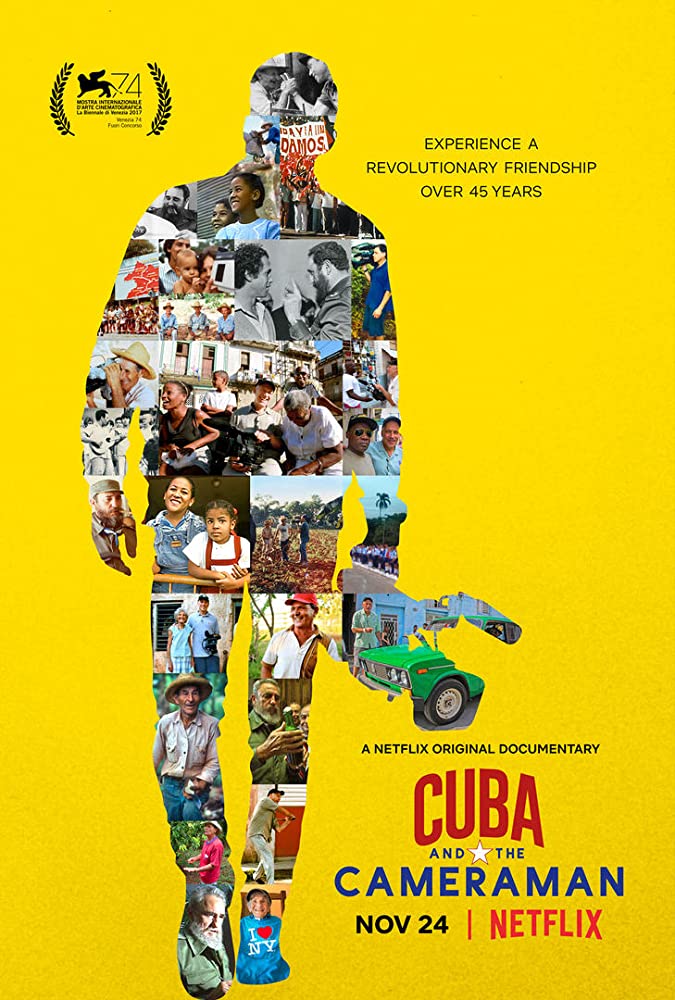خلال 40 عاما يتغير الكثير؛ قد يموت البعض، بمن فيهم فيدل كاسترو.. 40 عاما استطاع خلالها الصحفي وصانع الأفلام الأميركي جون ألبرت أن يتقرب من كاسترو لدرجة أن يسمح له بزيارته عندما كبر جدا في السن.. تبادلا الهدايا، ليس كصديقين حميمين، بل لأن ألبرت صحفي مخضرم نادر ينتمي إلى مدرسة صحفية لا نراها كثيرا اليوم.
رشح جون ألبرت عدة مرات لجائزة أفضل "فيلم وثائقي" في جوائز الأوسكار عن فيلمه "كوارث غير طبيعية في الصين.. دموع مقاطعة سيشوان" عام 2009، وفيلم "الفداء" عام 2012. وفاز بجوائز إيمي عن فيلمه "طوارئ بغداد" عام 2006، وفيلم "ميدان التحرير.. 18 يوما من ثورة مصر غير المكتملة" عام 2012.
شارك في عدة مهرجانات سينمائية عالمية وأنجز أكثر من 30 وثائقياً بين طويل وقصير. دفعه عمله الصحفي وشغفه التصويري للسفر إلى كثير من البلدان والتصوير في المناطق الساخنة في العالم. كان أول صحفي أميركي يدخل كمبوديا بعد حرب فيتنام. سافر إلى إيران أثناء أزمة الرهائن، وأنجز العديد من التقارير الحصرية. من إيران عبر الصحراء، كان أول صحفي يدخل أفغانستان مع "المجاهدين". وكان الصحفي الغربي الوحيد الذي بقي في نيكاراغوا بعد تولّي "الجبهة الساندينية للتحرير الوطني" الحكم، والصحفي الوحيد في أرض المعركة في حرب الكونترا.
تقارير كثيرة أنجزها ألبرت أيضاً من الصين والفلبين وروسيا وكوريا. وخلال حرب الخليج، كان الوحيد الذي تمكّن من نقل مشاهد غير خاضعة لرقابة السلطة الأميركية، وهو ما عرضه للكثير من المضايقات، حتى إنه طرد من المحطات التي كان يعمل فيها. وهو أيضاً الصحفي الأجنبي الوحيد الذي أجرى مقابلة مع صدام حسين.
لكن شهرته في أنحاء العالم ترجع إلى أنه واحد من الأميركيين القلائل الذين دخلوا للتصوير في كوبا على مدى العقود الخمسة الماضية، ولديه العديد من الاتصالات والمقابلات المباشرة مع فيدل كاسترو، وهو الأميركي الوحيد الذي كان على متن الطائرة التي نقلت كاسترو إلى نيويورك لإلقاء خطابه في الأمم المتحدة عام 1979.
نتيجة لكل ذلك، ونتيجة لسفره إلى كوبا باستمرار، وعلاقته مع الشعب والدولة الكاريبية التي استمرت 45 عاما، وبسبب العمل الصبور والعمل المنهجي والتصوير (أكثر من ألف ساعة من المواد المصورة)، قدم ألبرت فيلمه "كوبا والمصور" عام 2017، وهو وثائقي صحفي بنغمة نادرة، موضوعي يوجه أسئلة أيدولوجية دون مقص رقيب.
زار ألبرت كوبا لأول مرة في أوائل السبعينيات، ثم تكررت زياراته حتى وفاة كاسترو عام 2016. أظهر المراحل المختلفة في حياة الجزيرة؛ نشوة البداية والثورة، السنوات الذهبية للبلد الاشتراكي، الفترة الخاصة بعد انهيار المحور الشيوعي، الهجرة، السوق السوداء، العقوبات الأميركية، الانفتاح التدريجي نحو الاستثمار الخاص الأجنبي والازدهار السياحي، وموت كاسترو.
لم يكن هذا هدفه الوحيد، بل كوّن ألبرت صداقات عبر هذه السنين، وكان يعود مرارا وتكرارا ليلتقي نفس الأشخاص ويسألهم عن أحوالهم: كاريداد، فتاة ستنتهي قصتها بالهجرة إلى فلوريدا. ولويس، العاطل عن العمل الذي يؤمّن قوته في السوق السوداء. والإخوة بوريغو، الفلاحون.. . شخصيات كثيرة يلتقيها ألبرت، نراهم عبر كاميرته يتقدمون في السن (ثم يموت بعضهم)، حتى ألبرت نفسه (الآن 72 عاما) وكاسترو يكبرون على الشاشة. لذا فإن "كوبا والمصور"، بالإضافة إلى أنه يشكل وثائقيا اجتماعيا سياسيا، هو أيضا رؤية مباشرة عن آثار مرور الزمن على البلاد والبشر.
مدرسة ألبرت في الصحافة نادرة، فهو يعرف كيف يتكلم مع من يحاور. لا يقدم نفسه على أنه صحفي، وإن كان ذلك واضحا من كاميرته التي يحملها دائما، خاصة في زياراته الأولى، حيث كان يحمل الكاميرا والمعدات الثقيلة في عربة أطفال، وهذا ما لفت نظر فيدل كاسترو أول مرة.
يبني صداقات، يتعامل مع من يقابلهم بحب واحترام، يسأل عن أحوالهم باهتمام واضح. عندما يقابل كاسترو (في بعض الأوقات بطريقة شخصية جدا، مثلا في غرفته بالفندق في نيويورك)، يسأله بعجرفة أسئلة لا تخطر على بال أي صحفي "هل تحب البيرة، فيدل؟ هل ترتدي سترة واقية من الرصاص، فيدل؟".
ألبرت خفيف الظل، كاريزمي، يحب اللعب والفكاهة، مع القليل من الغوغائية. أما الأنا فيعرف كيف يحتويها حتى أثناء وجوده على الشاشة. لا يخفي تعاطفه مع الثورة الكوبية وحبه غير المشروط لشعب الجزيرة، "تجربة اجتماعية ألهمت وأغضبت العالم" يقول ألبرت. ليس بساذج، ولا ينكر الحقيقة، خاصة في فترة الحصار مع النقص المطلق في الغذاء والدواء وانقطاع الكهرباء، والسطو، والشعور العام بالألم وخيبة الأمل، والفرار إلى الولايات المتحدة لإيجاد مستقبل أفضل.

"قالوا لي: ماذا تفعل؟ وأجبت: أريد أن أرى كوبا". يقول المخرج عن رحلته الأولى للجزيرة التي وصل إليها مع زوجته على متن قارب شراعي وتم القبض عليهما.. "شرحوا لي أنني لا أستطيع الدخول، قلت لهم: مجانين، لديكم بلد جميل، لماذا تخفونه؟". يبتكر ألبرت رحلة عبر الزمن، وقبل كل شيء نجاحات وإخفاقات الثورة الكوبية. عمل صحفي يعرف ما يريد، وكيف يأخذ ما يريد. أوضح لحظات مختلفة في تاريخ كوبا، من أوائل السبعينيات عندما كانت البلاد تشهد تنمية اجتماعية واقتصادية متسارعة، ثم كارثة التسعينيات بعد اختفاء الاتحاد السوفياتي، والوضع الحالي للتغيرات والتحديات الاقتصادية والاجتماعية.
يثير الوثائقي تفسيرات سياسية وأخلاقية تتعلق بمهنة الصحافة نفسها. المثالية التي بدت فيها كوبا بعد الثورة كانت ساذجة بعض الشيء رغم أنها حقيقية، ثم جاءت اللحظات الصعبة بسبب الحصار. لذلك، فإن تعاطف ألبرت لم يمنعه من إظهار العيوب والإحباطات بفظاظة ومن دون تجميل.
الكثير من الأسئلة نحملها معنا بعد مشاهدة الوثائقي، وهي أسئلة مشروعة في عالم الصحافة، حتى لو أن الموضوعية كانت الهدف الأساسي، إلا أن لكل صحفي أن يسأل نفسه ويسأل ألبرت: هل تمكن ألبرت -رغم وقوعه في حب كاسترو- من الكشف عن الكارثة التي حصلت في كوبا، خاصة أن الكثيرين يحمّلون كاسترو المسؤولية؟ هل ما حدث في كوبا هو بسبب فشل الثورة والحكم؟ هل يمكن للصحفي أن يظهر عاطفته تجاه شخصية مثيرة للجدل؟ وهل يؤثر ذلك على الموضوعية؟ هل ألبرت متعاطف بشكل مقلق مع "دكتاتور متهم بارتكاب انتهاكات خطيرة لحقوق الإنسان"؟ وهل نجح ألبرت في تقديم وثائقي موضوعي على الرغم من تعاطفه الواضح؟
صحيح أن ألبرت يعكس علاقته الشخصية مع فيدل، ويعكس ألم الشعب الكوبي بعد وفاته، لكن الوثائقي هو سجل وتاريخ دولة، وصورة للنشوة وأيضا للصعوبات الاجتماعية والحرمان. "كوبا والمصور" هو قبل كل شيء فيلم عاطفي، يعكس الخواص والتناقضات، ويناشد بناء مجتمع، والانفتاح على كوبا وشعبها الفرِح من الداخل كما يصفه ألبرت، وبالتأكيد محاضرة صحفية عن كيفية صنع فيلم وثائقي صحفي.













![Palestinian journalists attempt to connect to the internet using their phones in Rafah on the southern Gaza Strip. [Said Khatib/AFP]](/sites/default/files/ajr/2025/34962UB-highres-1705225575%20Large.jpeg)


























